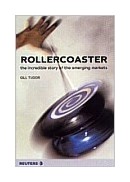|
||
• wydawnictwa polskie
• Zamów informacje o nowościach z wybranego tematu • kontakt
• Cookies na stronie |
ROLLERCOASTER THE INCREDIBLE STORY OF THE EMERGING MARKETSTUDOR G.wydawnictwo: REUTERS , rok wydania 2000, wydanie Icena netto: Niesamowita historia rynków wschodzących Świat schodzi do piekieł. A my razem z nim ...To wiadomość jaką przesłano z amerykańskiego Ministerstwa Skarbu do japońskiego wiceministra finansów, a która dotyczyła międzynarodowych afer, w przeddzień szczytu Wielkiej Siódemki we wrześniu 1998... Międzynarodowy system finansowy był na skraju katastrofy. Załamała się ekonomia od Tajlandii po Rosję. Rozpadły się fortuny w wielkich centrach finansowych a redukcji poddano miliony miejsc pracy. Katastrofę udało się ostatecznie odwrócić, ale wstrząs jakiego doznał świat finansowy był widoczny. Rollercaster - to zbiór trzymających w napięciu historii o wzlotach i upadkach rynków wschodzących. Dobrze i inteligentnie napisana książka. Naświetla czytelnikowi perspektywę współczesnej ekonomii i historię finansową rynków wschodzących. Rollercoaster, to coś, co zainteresuje zarówno ubezpieczycieli, ekonomistów, praktyków rynkowych, jak i okazjonalnych inwestorów. - Isaac Tabor Jednym z głównych zadań ekonomii konkurencji jest zrozumienie zasad funkcjonowania rynku i właśnie ta książka wnosi wielki przyczynek do tej tematyki. - Ed Mayo Gratulacje dla Gill Tudor za interesujące badania, ilustrujące tę stronę globalnego kapitalizmu, którą tak niewielu rozumie.- Prof. Victor Bulmer-Thomas. Książka dostępna tylko w wersji anglojęzycznej
The world is going to hell. We've got to co-operate ... was a message sent from the US Treasury to Japan's vice finance minister for international affairs on the eve of the September 1998 G7 summit ... The global financial system was on the brink of disaster. Economies were crashing from Thailand to Russia, fortunes were lost in the world's financial centres and thousands of jobs were axed. Disaster was eventually averted, but the shaky foundations of the world's financial architecture had been exposed... A new book, Rollercoaster, tells the tale of emerging markets as a gripping story, relevant not only for market specialists but for the wider business and general reader. The emerging markets, the Wild West of global capital in the 1990s, had begun to sour. The Latin American 'Tequila Effect' of 1994 posted an advance warning of the trouble to come, but IMF intervention and short memories led to rapid and huge reinvestment in emerging Until, in 1997, the apparently buoyant Tiger economies were sunk dramatically under a tidal wave of debt, currency collapse and stock market panic. The contagion of the 'Asian flu' spread rapidly, afflicting major markets such as Russia, Hong Kong and Japan - and had a knock-on effect on all the world's largest economies. By October 1998, a month after the G7 summit, $4.3 trillion had been wiped off the value of the world's stock markets. This book discusses the circumstances behind the rollercoaster rise and fall of emerging markets, the steps taken to prevent disaster, and outlines lessons for the future. Author Gill Tudor is a Reuters journalist currently working as London-based Emerging Markets Correspondent, and reported on the 1997-99 crisis, from the viewpoint of the London financial industry. Księgarnia nie działa. Nie odpowiadamy na pytania i nie realizujemy zamówien. Do odwolania !. |


